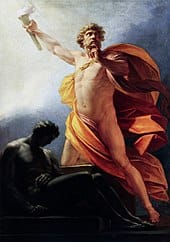
Prometheus stands out in Greek mythology. Known for his wisdom and cleverness, he symbolizes defiance and sacrifice. His story deals with rebellion, knowledge, and the costs of progress. This article will explore who he was, his actions, and why his myth still matters today.
Who Was Prometheus?
He was a Titan, a powerful race of divine beings. He was the son of Iapetus and Clymene. Though part of this mighty family, he set himself apart. Unlike other Titans, he used his intelligence to help humanity. His name, “forethought,” speaks to his ability to plan ahead and see what others could not.
He wasn’t just strong—he was a trickster and a strategist. He often defied the gods to benefit humankind.
The Creation of Humanity
He played a vital role in creating humans. While his brother, Epimetheus, gave animals their traits, humans were left without anything special. He shaped humans from clay and decided to gift them fire. Fire was more than just warmth—it brought knowledge, creativity, and the spark for civilization.
He stole fire from the gods and gave it to humans. This act empowered humanity to build, create, and advance. But Zeus, the king of the gods, was furious and decided to punish Prometheus.
The Punishment of Prometheus
Zeus punished him harshly. He chained him to a rock, where an eagle would eat his liver every day. The liver would grow back each night, making the punishment eternal. This ordeal symbolized the consequences of defying the gods.
Even in the face of endless pain, he never gave in. His determination made him a symbol of rebellion. Eventually, Heracles (Hercules) freed him by killing the eagle and breaking his chains, but his endurance became a timeless story of sacrifice.
Prometheus’ Legacy
Prometheus’ myth left a lasting impact on philosophy, literature, and art. He represents the pursuit of knowledge, rebellion, and self-sacrifice.
- In Philosophy: He embodies human creativity and defiance. The philosopher Nietzsche saw him as a symbol of strength and rebellion against authority.
- In Literature: Aeschylus’ Prometheus Bound dramatizes his suffering. In Mary Shelley’s Frankenstein, Dr. Frankenstein echoes Prometheus by defying nature and creating life.
- In Art: Artists have long depicted Prometheus as a powerful, tormented figure. His images show both his strength and suffering.
- In Modern Culture: Prometheus’ story continues to influence modern films, comics, and games. Ridley Scott’s Prometheus (2012) explores themes of creation and knowledge, directly inspired by the myth.
Why Prometheus Matters Today
His story still resonates today. His act of stealing fire represents humanity’s drive for knowledge. Like him, we push the limits of science and technology. But his punishment also warns us about the dangers of unchecked power and knowledge.
In today’s world, advances in artificial intelligence and genetics raise serious ethical questions. How much should we push the boundaries of what’s possible? What consequences await us? Prometheus’ eternal suffering reminds us that progress often comes at a steep price.
Conclusion
Prometheus, the god of foresight, symbolizes defiance, sacrifice, and progress. His story challenges us to question knowledge and power. Whether in ancient myths or modern discussions, Prometheus remains a key figure. His legacy as a rebel and a martyr for humanity’s advancement will continue to inspire for generations.

